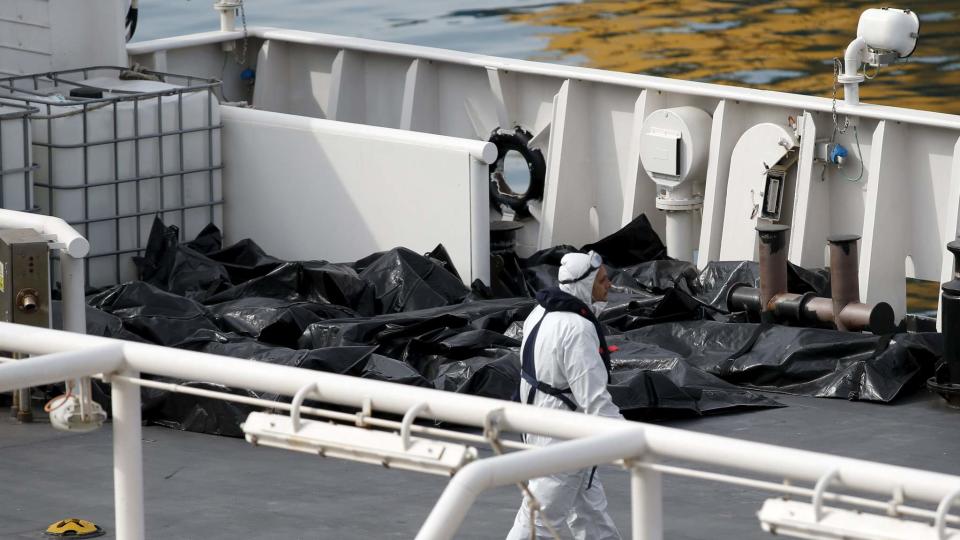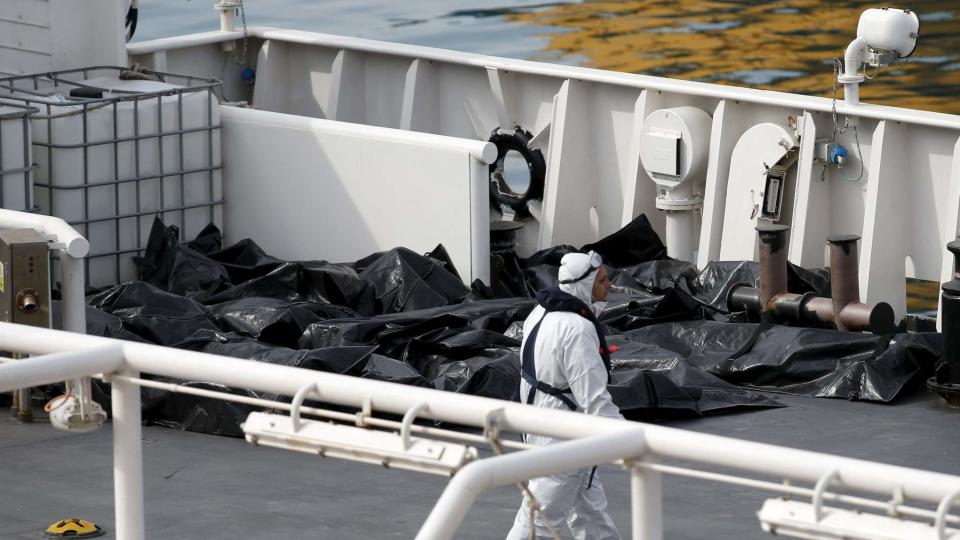Bodies Of Drowned Refugees Arrive In Malta
Body bags containing the 24 corpses of refugees who drowned after a smuggler's boat sank off Libya have arrived in Malta.
The Italian coast guard vessel Bruno Gregoracci docked at Boiler Wharf in Valletta's Grand Harbour on Monday, with the victims of the Mediterranean tragedy laid out on its deck.
The bodies were then carried into waiting hearses to be transferred to a morgue.
Some 28 survivors of the disaster were also on board the Italian vessel. They will be brought to Italy later on Monday.
Officials say at least 700 people are feared to have died after the boat capsized and sank, but Italian prosecutors - citing a survivor - say as many as 950 migrants may have been on board.
The 32-year-old Bangladeshi survivor told Italian authorities that hundreds of people had been locked in the hold of the vessel by smugglers.
Italian prosecutor Giovanni Salvi said the boat had three levels and the migrants were locked on the second level, as well as the hold.
It is believed the vessel overturned when migrants moved from one side of the boat in a bid to get off and be rescued by an approaching merchant ship.
Italian and Maltese navy boats have continued to scour the waters off Libya for more survivors.
Italy's Prime Minister, Matteo Renzi, also said his country was working with Malta on Monday to rescue migrants from two more boats , which are thought to be carrying 400 people between them.
Also on Monday, Greek authorities said at least three people have died, including a child, after a wooden boat carrying dozens of migrants from Turkey ran aground off the coast of Rhodes.
It comes as EU foreign ministers meet in Luxembourg to discuss the growing crisis of refugee deaths in the Mediterranean.
As news of the tragedy emerged on Sunday, Mr Renzi demanded an emergency summit of the EU's 28 leaders.
It has since been announced there will be a European Council meeting on the crisis on Thursday in Brussels.
Prime Minister David Cameron, who will attend Thursday's meeting, admitted Britain "can do more" to help deal with the situation.
"I think what we need is a comprehensive plan that does involve elements of search and rescue but, crucially, we have got to do more to deal with the problems in the countries from which these people are coming," he said.
"And we have got to crack down on the terrible traffickers and people smugglers who are at the heart of this problem.
"Britain can do more and lend a hand, and in that spirit I will be going to the European Council meeting on Thursday."
The number of people killed among those seeking refuge in Europe is believed to be 1,500 this year alone.
Last year, 3,500 people died or went missing while trying to travel from Africa to Europe, according to the UN High Commissioner.
EU foreign policy chief Federica Mogherini said: "It was our moral duty to concentrate our responsibility as Europeans to prevent these kind of tragedies from happening again and again.
"We must build a common sense of European responsibility... knowing that there is no easy solution, no magic solution."
The Italian Prime Minister said Italy is studying the possibility of mounting "targeted interventions" against Libya-based people smugglers.
"The hypothesis of military intervention (to stabilise Libya) is not on the table... but what is possible are targeted interventions to destroy a criminal racket," Mr Renzi said.
"Attacks on death rackets, attacks against slave traders (traffickers) are in our thinking."
And Malta's Prime Minister Joseph Muscat said the UN should enable a force to intervene directly in Libya to disrupt traffickers and stop the boats from setting off.
Italy closed its dedicated maritime search and rescue mission "Mare Nostrum" last year due to the cost after it was unable to persuade European partners, including Britain, to help meet its €9m (£6.5m) per month operating costs.
Its replacement, the Europe-wide border protection operation "Triton", has been criticised as inadequate.

 Yahoo News
Yahoo News 

